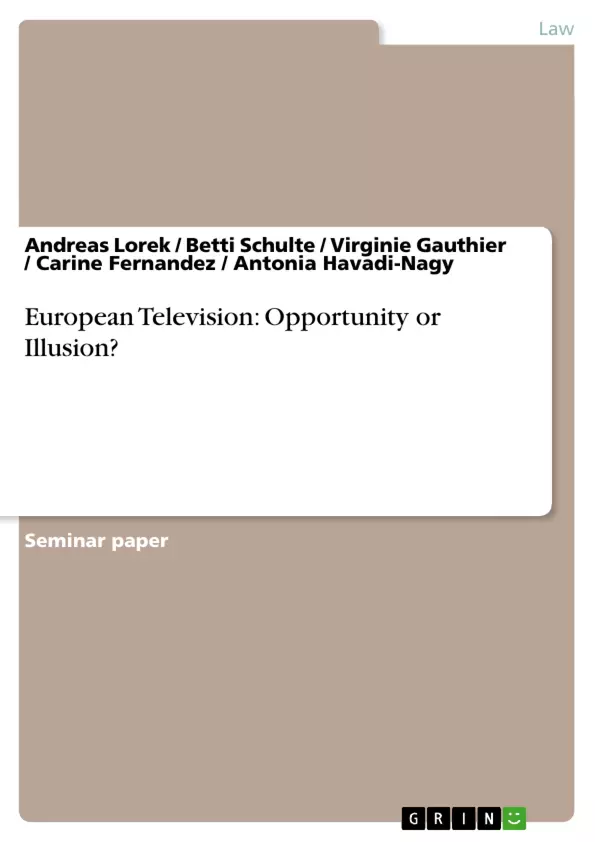With the European Union and the growing importance of Media, it
is quite obvious to think of a European Channel, which could bring
different European cultures, interests and peoples together. As
one can look at this complex topic from many different angles, we
would like to divide our work into three parts in order to make it as
structured and as understandable as possible.
The first part consists of guidelines, regulations and restrictions by
the European Union, discussing the different interest of the
European Union and the individual Member States concerning
media issues.
In the second part we introduce two former European TV projects,
which failed because of several problems, such as cultural
differences.
Finally we focus on ARTE, the Franco-German corporation, which
is an example of cross-cultural communication within Europe by
creating a European cultural channel. We give a short overview
and discuss the difficulties, which can rise because of intercultural
differences.
Throughout the paper we try to get to an answer whether
European TV is an Opportunity or an Illusion?
Inhaltsverzeichnis (Table of Contents)
- I. EUROPEAN TV: OPPORTUNITY OR ILLUSION?
- II. EUROPEAN UNION MEDIA SUPERVISION.
- II.1. Competition supervision
- a. Structure and functions according to the European Law supervisory bodies
- b. Legislative framework in the broadcasting and new media sectors
- c. Important legislative acts
- d. Competition legislation
- II.2. Supported Guidelines by the European Union:
- III. EUROPEAN TELEVISION PROJECTS
- III.1. Eurikon.
- III.2. Europe-TV (working title: Olympus)
- a. What were the intentions for Europe-TV?
- b. Why did Europe-TV stopped so fast?
- IV. THE EXAMPLE: ARTE
- V. PROBLEMS OF ARTE
- a. Financial problems:
- b. The language problem:
- c. Concurrence from other television channels:
- V. CONCLUSION:
Zielsetzung und Themenschwerpunkte (Objectives and Key Themes)
This paper explores the potential and limitations of European television, examining whether it represents a true opportunity for cultural exchange or merely an illusion. The authors analyze the existing media supervision framework within the European Union, focusing on competition and regulations related to broadcasting and new media. They further explore the successes and failures of past European television projects and delve into the specific example of ARTE, a Franco-German cultural channel, to shed light on the challenges of cross-cultural communication within a European context.
- European media supervision and its impact on the television landscape
- Competition and regulatory frameworks within the broadcasting and new media sectors
- The challenges of creating and sustaining pan-European television projects
- Cross-cultural communication and its role in European television
- The potential of European television to foster cultural exchange and understanding
Zusammenfassung der Kapitel (Chapter Summaries)
The first chapter explores the idea of a European television channel and its potential to bring diverse cultures together. It highlights the regulatory frameworks and restrictions imposed by the European Union, discussing the different interests of the EU and its member states regarding media issues.
The second chapter delves into the European Union's media supervision system, focusing on competition supervision. It details the structure and functions of relevant supervisory bodies, the legislative framework in the broadcasting and new media sectors, and important legislative acts, including the “TV without frontiers” directive.
The third chapter introduces two failed European television projects, Eurikon and Europe-TV, highlighting the challenges they faced, such as cultural differences. It examines the intentions behind these projects and the reasons for their early termination.
Schlüsselwörter (Keywords)
The main keywords and focus topics include European Union media supervision, competition regulation, broadcasting and new media, European television projects, cross-cultural communication, cultural exchange, ARTE, and the challenges of creating and sustaining pan-European television channels.
Frequently Asked Questions
Is European TV a real opportunity or just an illusion?
The paper explores this question by analyzing the challenges of cultural differences, language barriers, and financial problems that have caused many pan-European TV projects to fail.
Why did early projects like Eurikon and Europe-TV fail?
These projects failed primarily due to cultural differences between member states, lack of funding, and difficulties in creating content that appealed to a diverse European audience.
What makes ARTE a successful example of European television?
ARTE is a Franco-German cooperation that succeeds as a European cultural channel by focusing on cross-cultural communication, though it still faces language and financial challenges.
How does the European Union supervise media?
The EU exercises media supervision through competition laws, legislative frameworks like the "TV without frontiers" directive, and specific regulatory bodies to ensure fair broadcasting standards.
What are the main problems facing European TV channels today?
Key issues include financial sustainability, the language problem (translation/dubbing), and heavy competition from established national and international television networks.
- Quote paper
- Andreas Lorek (Author), Betti Schulte (Author), Virginie Gauthier (Author), Carine Fernandez (Author), Antonia Havadi-Nagy (Author), 2002, European Television: Opportunity or Illusion?, Munich, GRIN Verlag, https://www.grin.com/document/20911



